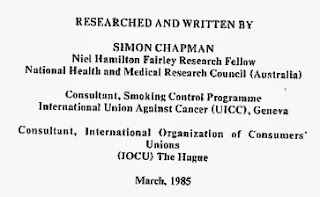The BBC has run a little article asking various people "how to curb obesity". Predictably enough, the British Medical Association wants to reach for the statute book:
Prof Sheila Hollins, chairwoman of the British Medical Association's Board of Science, says a complete ban on advertising junk food would make a real difference.
"Environmental factors, including the promotion of unhealthy food and poor infrastructure for active means of travel, have had a negative impact on people's eating habits and activity levels and have exacerbated the UK's obesity problem.
"With an alarming rise in the levels of obesity among children, the BMA is urging the government to introduce a complete ban on the advertising and marketing of unhealthy foodstuffs".
This is all very strange because I seem to recall them promising us that there would be no "slippery slope" that led from banning tobacco advertising to banning advertising of other products. In 1985, for example, the BMA published a pamphlet calling for a complete ban on tobacco advertising, which explicitly described the slippery slope argument as a "deception":
The 'thin end of the wedge...'?
A further deception is the industry's appeal: "Where will they stop?" The industry argues that if advertising is stopped because tobacco is dangerous, then advertising for cars, motor cycles, alcohol, sugar, aircraft travel and any other potentially dangerous product could also be banned.
All of these products can endanger health, but they are dangerous only when abused. Tobacco is the only advertised product which is hazardous when used as intended.
With the BMA now demanding a total advertising ban not only on alcohol but also on a whole range of food, the author of this document must be feeling like a bit of a chump today.
So who was this propagandising plonker writing for the BMA back in 1985? Step forward, veteran prohibitionist "Simple" Simon Chapman...



4 comments:
The 'slippery slope' is always real. It's also called change. It happens in society all the time.
For example, the pressure grew in the 1990s for 'civil partnerships', to allow unrelated people to become legally responsible for each other. Initially we were assured it was nothing to do with sexuality - slippery slope.
Then civil partnerships became related to 'same-sex partnerships', but we were assured it would not lead to 'gay marriage' - slippery slope.
Then gay marriage came along - and you will now find people protesting against it are routinely and publicly denounced as 'bigots' and 'homophobics' - slippery slope.
Personally, I don't see why I - as a committed loner - can't marry myself, and I don't see why a father can't marry his son. In a time when the President of France has a 'girlfriend' who is the 'First Lady', marriage has ceased to have much meaning anyway.
But that was the slippery slope embarked on 20 years ago.
I'm not taking sides on slippery slopes. I'm merely saying they do exist.
If Hollande was gay, I guess his boyfriend would be the "second man".
I think I might have told you before that I was at a party with Chapman (he was there) and there were a few moments where he might have been in a precarious position on a balcony.
@Andrew - It's worth while pointing out that a lot of what you call "change" has to be enforced by those in authority. It is not a natural process.
Ok, you do give such an example (the concept of "homophobia"), but the neutral tone of your comment is puzzling. There is a cost to "change" which is enforced from on high.
Post a Comment